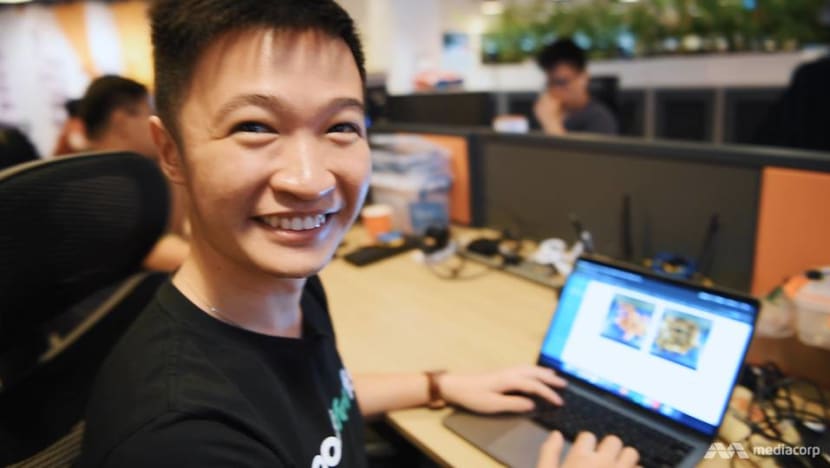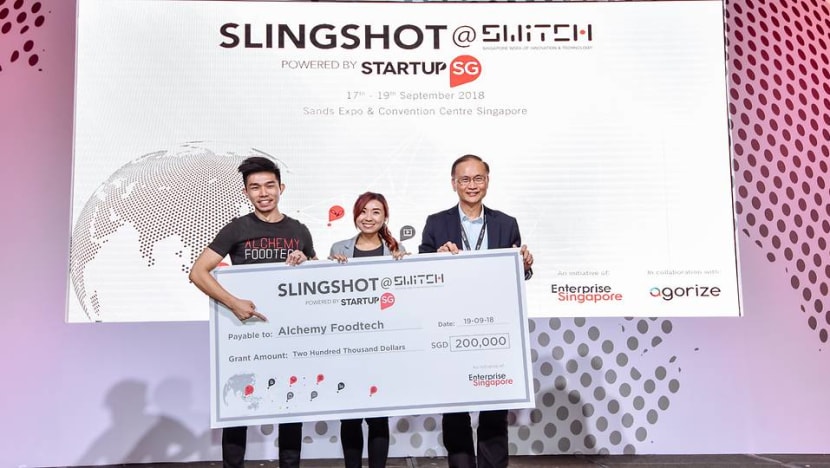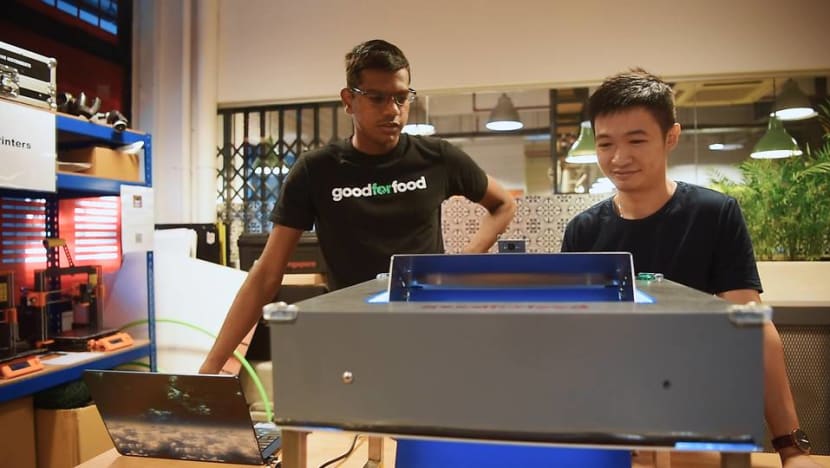commentary Commentary
Commentary: The future just got brighter for aspiring Singapore tech entrepreneurs
A slew of grants, programmes and high-level political attention on the start-up scene has given aspiring entrepreneurs in Singapore a boost, says Oon Tian Sern.

Rayner Loi.
SINGAPORE: A piece of news went relatively unnoticed last month, when Prime Minister Lee Hsien Loong hosted a two-hour lunch discussion with 10 Singapore entrepreneurs running high-tech start-ups from various industries on new and innovative ways to nurture “more homegrown unicorns”.
PM Lee said he had a candid discussion with them about the challenges of doing business and attracting top talent in Singapore.
“The range of industries – from tech and fashion to transport and logistics – spoke well of the vibrancy of our start-up scene,” he said in a subsequent Facebook post. “We are growing a strong start-up ecosystem and will continue to find new and innovative ways to support local businesses.”
Those in attendance, which include founders of Carousell, Ninja Van and Love, Bonito, generate multimillion-dollar sales and numerous job opportunities for the Singapore workforce.
PM Lee’s lunch drew attention where entrepreneurs have been given scant attention in Singapore. A comment from cofounder of Pslove Tan Peck Ying sums this up: “In our minds, we always think that the prime minister meets only the big companies.”
But I would argue that as an advanced country with one of the highest GDP per capita in the world, that have exploited advantages in manufacturing, engineering and other high-tech fields that require an educated, high-skilled workforce, the next stage of Singapore’s ascent up the economic ladder will depend heavily on its ability to continuously innovate and develop indigenous deep tech.
2019 was a significant year for the Singapore tech start-up scene. Carousell achieved a valuation of over S$1 billion. Shopee opened its new Singapore headquarters in Science Park, with Razer and Grab announcing plans to do so in 2020.
Much of this challenge will rest on the shoulders of high-tech start-up founders, but a report by NUS Enterprise in 2017 on the Growth Dynamics of High-Tech Start-ups in Singapore suggest only one in two start-ups will survive beyond five years.
READ: Commentary: The future of Singapore e-commerce is in brick and mortar

The same report, however, notes that this rate of success is higher compared to the US and UK, advanced economies high on the innovation rung.
The challenge seems one of financing and customer acquisition. The same study revealed that 85 per cent of young start-ups relied on self-funding, while 57 per cent tapped on personal contacts to reach its first customers.
A VIBRANT TECH START-UP SCENE
If the next stage of Singapore’s growth shifts from a reliance on multinational corporations towards homegrown start-ups that we hope to scale-up and internationalise, then it’s worth pouring more resources into boosting support for entrepreneurs.
“The ferment, the effervescence, the ingenuity and brilliance which has gone into the tech scene has already made a big change in the world,” PM Lee said in a dialogue with venture capital firm Sequoia Capital in 2017.
READ: Commentary: The revival of the digital economy – building citizen confidence as Smart Nation momentum picks up
READ: The Singapore gig economy: Right balance on regulations needed to unlock its full potential, say experts
Singapore youths recognise this and want a piece of this pie. More are stepping forward to start a business and innovate.
The proportion of youths starting their own business that lead to intellectual property ownership and expansion overseas have increased in 2016 compared to 2010.
National University of Singapore Overseas College, a hugely successful entrepreneurial education programme, has 3,300 alumni members over 17 years and one in three have gone on to start their business.
In tandem, the number of opportunities aspiring entrepreneurs can tap on to maximise their chances of success has grown.

On a macro level, policymakers have invested S$19 billion to enhance our capabilities to be a Global-Asia node of technology, innovation and enterprise under the Research, Innovation and Enterprise 2020 administered by the National Research Foundation.
Entrepreneurs can access a range of financial support today, from early-stage funding to support for capability development, business transformation and overseas expansion – which include a spectrum of instruments from matching funds, grants to offset costs and equity funding.
For instance, first-time entrepreneurs can apply for S$30,000 Start-up SG Founder Grants with 45 Accredited Mentor Partners, some of whom offer equity-free advice, networks and learning programmes in administering the grant applications.
Indeed, beyond financial support, grants are increasingly providing both monetary and non-monetary support. Youths are also encouraged to nurture their budding entrepreneurship inclinations in more recent years.
TECH FOR GOOD
More organisations are getting into this space to catalyse the development of tech for public good, recognising the changing role of the private sector, the importance of developing stakeholder capitalism and corporates that address critical societal challenges and include Environmental, Social, Governance (ESG) and Sustainable Development Goals (SDG).
This was the key theme at the World Economic Forum that concluded this month.
READ: Commentary: Give workers permission to disrupt – one way Singapore businesses can accelerate digital transformation
READ: Commentary: Why aren’t more Singapore businesses transforming? Mindsets aren’t the key obstacle
The SG Youth Action Plan, led by the National Youth Council and Ministry of Culture, Community and Youth, has rolled out a Youth Action Challenge, which allows aspiring young entrepreneurs to team up to formulate solutions to issues ranging from societal, environmental and the future of work and reshape Singapore. Winning teams can secure up to S$50,000 grant to implement their ideas.
Since September 2018, the Tote Board has piloted Shared Gifting – a new form of funding that empowers selected grant administrators from non-profit organisations, tech entrepreneurs and social enterprises to oversee the use of S$2 million grant to deliver projects that would improve children and youth mental health.
Through the selection process, eight were appointed to manage funds from Tote Board. They collectively decide the projects to fund that meet the grant mandate, and can propose their own projects or collaborate as a collective entity on a single project to maximise returns.
READ: From fighting diabetes to food waste, start-ups cook up new ideas for food

Such mechanisms afford budding entrepreneurs with the most innovative ideas the platform to interact with and learn from public and private sector professionals, familiarise themselves with industry-specific challenges and improve their business value-proposition.
An entrepreneur in such network benefits from the resource sharing and know-know to reach their customers.
One expects more of such programmes to mushroom as more advanced economies move towards tapping on innovation as a bigger driver of growth. Budget 2020 also bears watching for many in this scene.
KNOCK-ON BENEFITS FOR ENTERPRISE DEVELOPMENT AND INTERNATIONAL EXPANSION
What is significant in both programmes, however, is the de-emphasising of track record in favour of promoting innovation, and the knock-on benefits for enterprise development.
This skews the focus towards innovative but untested ideas, rather than a bias for established companies and proven ideas many private equity and venture capital funds look to.
Such programmes may be riskier but may find a few diamonds in the rough compared to safer grant and accelerator programmes.
Finally, the presence of a community of stakeholders motivates and nurtures youth entrepreneurship.
This also provides a foundation for local players to understand each other’s strengths, as a basis for future collaboration when companies mature and seek to grow beyond serving the domestic market.
In fact, to enhance competitiveness, local companies seeking to break into foreign markets will do well to team up instead of treating each other as rivals.

The resources poured into building the ecosystem to maximise the chances of an entrepreneur’s business becoming a homegrown unicorn is not a zero-sum game.
These growth-seeking tech start-ups in Singapore have introduced more new products, generate higher revenue on R&D and have a higher propensity to own IP assets, in addition to creating more jobs annually compared to start-ups in other areas.
Supporting more of such companies through innovative grant mechanisms can generate returns in the long-term and keep our economy vibrant as we enter the next stage of our economic development.
The success of these entrepreneurs will in turn, enhance Singapore’s start-up ecosystem, as entrepreneurs-turn-investors may form investment networks to fund the next generation of aspiring entrepreneurs.
Oon Tian Sern is founder of Acceset, recipient of the Queen’s Young Leader Award in 2018 and associate with the Philip Yeo Initiative.















